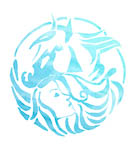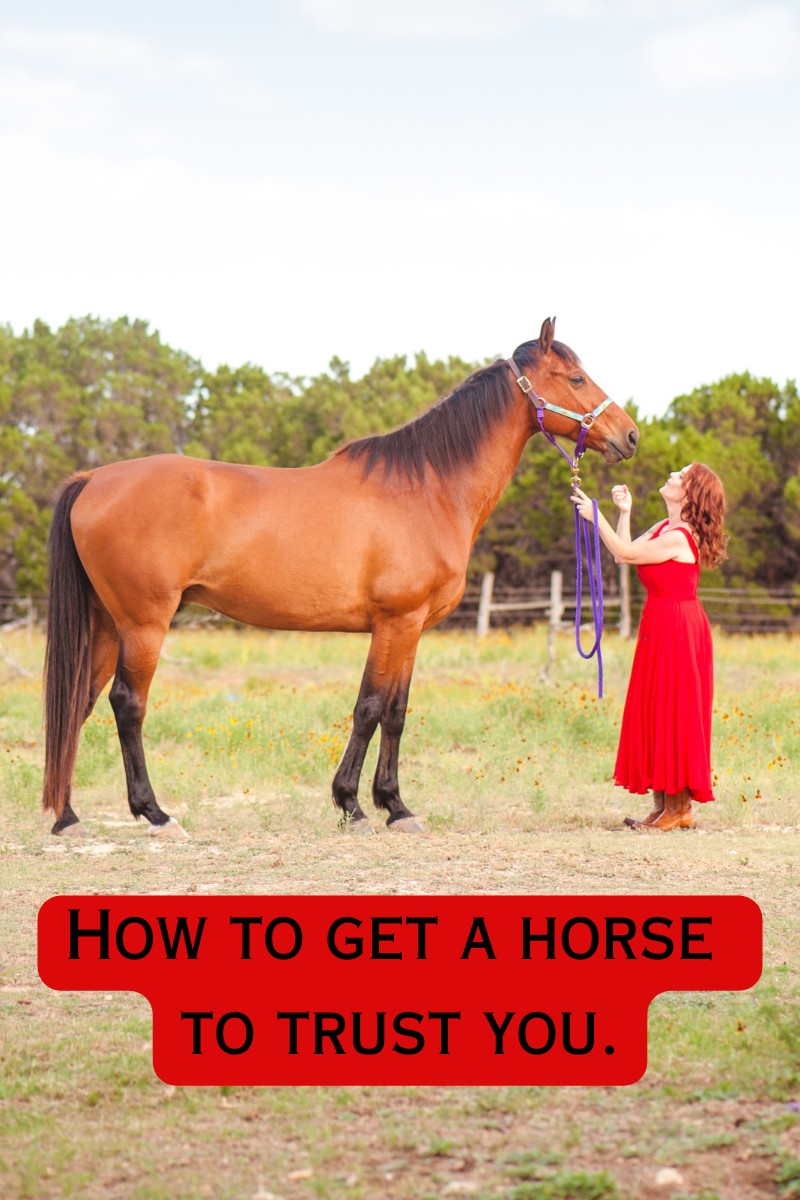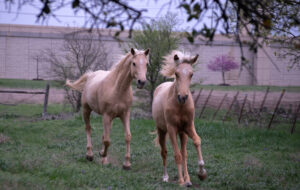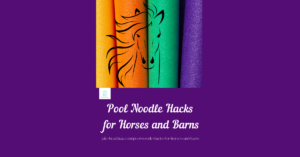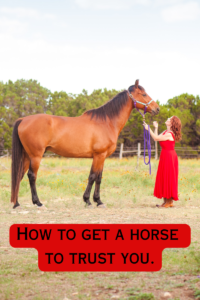
Horses Are People Too
Ultimately, if you want to know how to get a horse to trust you, you just need to remember “horses are people too.” OK, maybe not exactly and of course there are some key differences, but if you keep that statement in mind when you are interacting with horses, you will know how to get a horse to trust you much faster than you would otherwise.
A Few Things to Think About
- I've worked with horses of many different breeds, and horses of many different circumstances and while they all show it in different ways, what most of them WANT is to trust you. (There are some exceptions, but overall I feel this is true. Primarily because a horse always wants to feel safe wherever they are. If you are part of their environment, they WANT to trust you.)
- In wanting to know how to get a horse to trust you, first and foremost is to stop thinking of horses as “just horses.” There is no “just” about a horse. There are magnificent horses, intuitive horses, inspiring horses, intriguing horses, funny horses and even serious horses, but they are never “just a horse.”
- Horses have so much more to offer than riding. Having spent the large majority of my time with my horses on the ground with them, rather than on their backs, I've come to truly know and understand them. I don't understand them only as a horse, but as a friend. One of my current geldings, Ankh, for instance, knows things about me before I know them. He has “alerted” on me for migraines. He will tell me when it is time to leave the property as he seems to know there are other things I need to do. He's not usually an affectionate horse, but he knows before I do, sometimes days before, when I am going to experience a low spot emotionally and thus becomes very affectionate. He's truly like that best friend that knows when something is wrong and calls or texts to ask about it. Except he is 900 pounds of “best friend.”

How To Get a Horse to Trust You
When you think of horses as friends, rather than “just horses”, you have discovered the key to know how to get a horse to trust you. That is why “horses are people too” is a helpful reminder of how to treat and respond to horses.
Because if horses are your friends:
- You acknowledge their need to process new places, new things, and new experiences, just like you would a human friend. You wouldn't expect a friend to move to a completely new place, city, home, etc. or even to travel to different places without giving them time to adjust, to explore the new place, to rest after travel, to mourn leaving the old place, etc. Yes, horses do need time to process change and they do have emotions. In fact, they have a rich emotional life. You therefore must honor their need to adjust if they need it. Some horses, just like some people, tolerate change better than others. But oftentimes horses are expected to tolerate change instantly and that is detrimental to the horse. Ultimately that trickles down to the owner, rider or handler.
- You recognize that past experiences, and trauma in particular, can shape who they are today. Even more so than people, horses have a memory for people, events, trauma, etc. They will hold onto memories and react to anything that reminds them of that memory accordingly, whether positively or in a challenging manner. In the same way that a friend responds to life based on their experiences, so will a horse.
Using an objective view with horses, rather than taking things personally, will get a horse to trust you. You see them as a culmination of their life from the day they were born right up until the present moment. Trauma can be carried in the horse's body as tension, just like it can with people. (This is something I help clear in horses and people with my sessions.) - You know that it takes time to get to know a new horse, just like it takes time to get to know a new human friend. When you're getting to know a new friend, do you rush them into doing something just because YOU want to do it without any regards for what THEY want? If you've ever tried to do this, you know the response can be poor. Horses sometimes aren't given a choice about what they do. (And there are times that it is necessary, but not always.)
Try paying attention to what the horse likes or doesn't like. How do they respond? What behavioral signs are they showing you? Are they showing signs of stress such as a concerned eye, a lifted head, or even turning their head? Or are they relaxed, head dropped and unconcerned? Just like you have to learn what activities and experiences a human friend likes or dislikes, you want to do the same for your horses. - You know that everyone has good and bad days, both horses and people. Some days you may get to your horse and they are a little “off” or seem different. Others they seem to be having a great day. To get a horse to trust you, you have to recognize this day in and day out. Just like you show up with your own emotions, sometimes having a good day, sometimes having a bad day, they too have good and bad days. (Not to mention horses are brilliant at hiding pain.) You respond accordingly when friends or loved ones are having good and bad days. Doing the same with a horse engenders trust. They feel seen. And really, isn't that what we all want?
- You recognize that horses have strengths that you don't. Just like your friends have strengths that you don't, so do your horses. So, when your horse looks up sharply at something, or doesn't want to go a particular direction, give it some thought before responding. What do they know that you don't? Because some of their senses are far more powerful than yours. They can hear, see, and smell things for instance that you will never hear, see or smell. They can tune into emotions, intentions, and energy even better than me, and I have done so professionally for over a decade. If you want a horse to trust you, you have to trust him/her!
- You express gratitude for them. Being grateful for your friends means being thoughtful about what they like and need. What is their “love language” if you will? For instance, Ankh, who I mentioned above, isn't super keen on being touched except in very specific areas and even then he may only tolerate it for a very short time. Touch is not one of his love languages on most days. I do my best to acknowledge that and not touch him often.
But food treats? They are most definitely high on the list of rewards, as is rest. He really likes to be able to rest by himself or just with me. Fyre on the other hand, seen in the photo with his father Ankh above, would crawl in my skin if he could. He likes to be up close and personal.
And of course, being grateful for them means investing time in researching the best diet, environment and conditions for them. Do they like to be stalled or do they prefer pasture? Do they do best on a forage-based diet (what my horses get) or do they do better with a commercial feed? Coastal or alfalfa hay or both? (In Texas, these are the main two types of hay.) We have a responsibility as horse-owners to provide the best care within our means for our horse friends. When they know we are invested in them, they trust us even more.
In Summary
Ultimately, creating a perspective shift in how we treat horses, how we relate to them, and how we view them overall can create an entirely new type of relationship with these animals that inspire wonder and awe in us. They give us so much, shouldn't we match their gifts?
Other Examples?
I've really only scratched the surface on this topic. What examples do you have on using “horses are people too” as a philosophy for your relationship with your horses?
